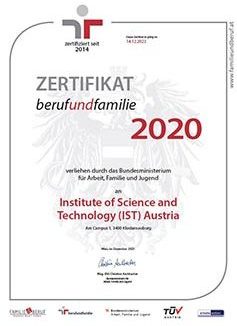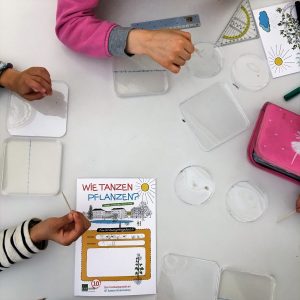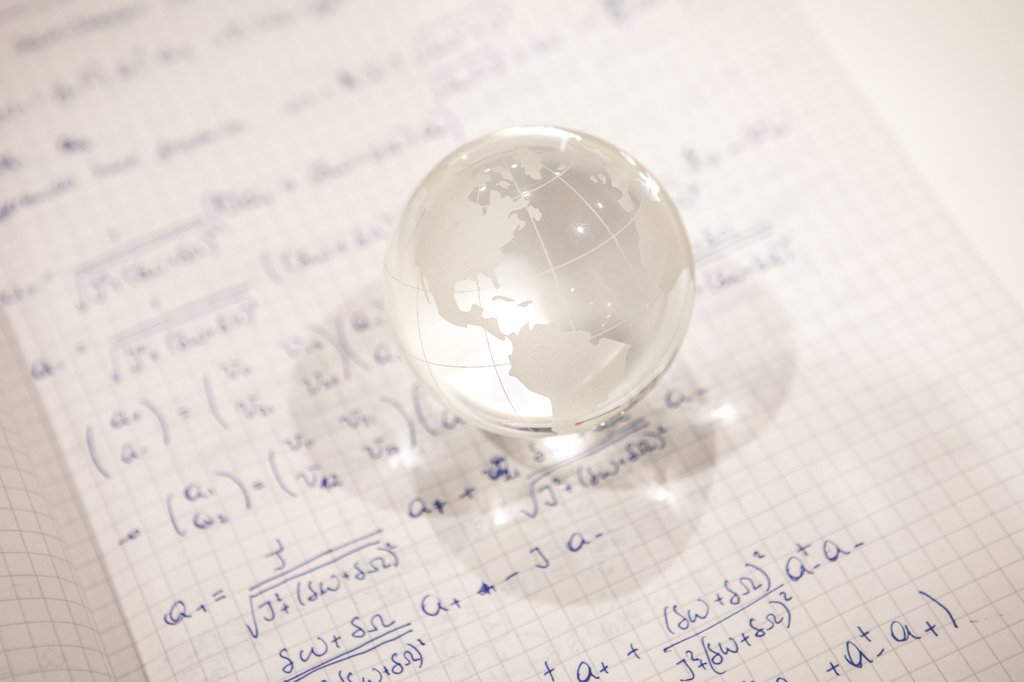
Family Services
The balance between work and family life is a significant challenge for employees and employers. Since its beginning, Institute of Science and Technology Austria (ISTA) has dedicated staff to support employees with family questions, and continuously tries to provide services which enable employees to balance family and work.
To this aim, ISTA participates in the Work and Family Audit since 2014. This 3-year Audit cycle helps organizations to evaluate and implement family-friendly measures under the supervision of the Federal Ministry for Women, Family, Integration and Media.
On this site:
Children & Education
Services on campus
ISTA runs the child care center Froschkönig on campus. English and German speaking caregivers provide excellent care of kids in the following groups: children from 3 months to 1 year, children from 1 year to 3 years, children from 3 to 6 years (school entry). All ISTA employees have the possibility to enroll their children at our childcare center (subject to availability).
Apart from an on-site child care center, a room on campus is specifically designed for family care and rest, and can be used, for example, for breast-feeding or in situations in which parents have to bring their children with them to work due to issues with their regular day care provider.
There is also a low-exposure lab for pregnant experimentalists that allows them to continue working without being exposed to harmful materials.
Maternity & parental leave
In Austria, maternity protection (Mutterschutz) refers to the period of 8 weeks before and 8 weeks after delivery. During this time, employment is strictly forbidden. This period can be prolonged before and/or after due to health reasons. The public social insurance (Sozialversicherung) of an employee continues during the time of maternity protection.
Parental leave is a legal right for absence due to the birth of a child. At the earliest it starts immediately following the maternity protection period or immediately after the parental leave of the other parent. The minimal duration for parental leave is 2 months. The latest return date to work is on the 2nd birthday of the child.
The amount of child-care allowance paid out during parental leave depends on the option you choose: the child-care allowance account (Kinderbetreuungsgeld-Konto) or the income-dependent child-care allowance (Einkommensabhängiges Kinderbetreuungsgeld).
Child care
The government provides substantial financial funding for younger children attending care, either in a public or private institution. Austria offers the following types of facilities:
- CRECHES / DAY NURSERIES / “Kinderkrippen”: For children up to the age of 3. Most nurseries accept children from the age of 1-2 years or younger.
- KINDERGARTENS / “Kindergarten”: For children aged 3-6.
- DAY-PARENTS / “Tageseltern” or “Tagesmütter”: Day-parents are private adults who, very often in addition to watching their own children at home, also take care of other parents’ kids. They receive a similar but shorter training than kindergarten-teachers. Day-parents may take care of children of all ages.
- AFTER SCHOOL CARE / “Hort”: With the big majority of Austrian schools only having classes from approx. 8:00 am to approx. 11:00 am or 2:00 pm, many parents need facilities to take care of their kids until they come back from work. Either schools take over this duty (“Ganztagesschule” – most of them are closed during the Austrian school holidays) or the children go to a separate facility (“Hort”).
In Austria, all children have to attend Kindergarten for at least 1 year for a minimum of 5 hours per day and 4 days per week. This mandatory year starts (at the latest) on the first day of September following the child’s fifth birthday.
Education
Austria has a free and public school system. All children residing permanently in Austria are subject to general compulsory education. Compulsory schooling starts in the year, in which the child has become six years till 31th August and lasts nine school years.
Primary school consists of four grades. Upon successful completion of the fourth year of primary school, pupils must attend one of the following types of school: the New Secondary School (Neue Mittelschule, NMS) or the Academic Secondary School (AHS). As far as the education of children with special needs is concerned, it is possible to attend a special school or to attend an integrated Lower Secondary School, New Secondary School or Academic Secondary School Lower Level.
More information:
The Austrian Education System by the Austrian Agency for International Cooperation in Education and Research
Local school option: BG/BRG Klosterneuburg International School
The Gymnasium BG/BRG Klosterneuburg offers a general education to pupils aged 10 to 18 residing in Klosterneuburg, e.g. 8 years of tuition, after primary school. It is an Academic Secondary School and prepares pupils for the Austrian Matriculation Examination (AHS Matura).
The BG/BRG Klosterneuburg also offers a bilingual program, which is taught in both English and German beginning in the 1st year. Admission to the bilingual program is by written and oral examination.
In 2010, the BG/BRG Klosterneuburg was authorized as an IB World School. The IB Diploma is a globally recognized qualification and it is a sign of the highest standards of academic achievement. The bilingual program as well as the IB program are sponsored by ISTA.
More information:
BG Klosterneuburg and The International Baccalaureate
School holidays
School holidays in Austria consist of 5 major holidays: 1 week Fall holidays (26.10-1.11), 2 weeks Christmas holidays (December-January), 1 week semester break (February), Holy Week + Easter Monday (March/April), and 9 weeks summer holidays (July-August). The exact dates of some school holidays differ between states. For Vienna and Lower Austria, the semester holidays take place during the 1st week of February and the summer holidays start in the 1st week of July.
November 15th is the feast day of Leopold III, the patron saint of Austria, Lower Austria, Upper Austria, and Vienna. Therefore, all schools in Klosterneuburg and Vienna are closed.
More information on education please find here:
- School holidays and national holidays in Austria
- Schools in Klosterneuburg (in German)
- Child care options and schools in Vienna (among many other things)
- Schools in Vienna
- International schools in Vienna
Partners & Dual Career
As part of its faculty recruiting process, the Institute offers dual career support to partners of recently appointed (or prospective) professors.
The ISTA Dual Career office helps to facilitate the job search and application process. It offers insights into the Austrian job market and provides support adjusted to individual needs.
In addition, ISTA is a member of the Dual Career Service Support (DCSS) network of Vienna’s Science and Technology Fund, whose aim it is to explore concrete employment. This service is in close coordination with the Austrian Network for Dual Career (ANDC), of which ISTA is also a member organization.
ISTA offers the opportunity for internships from 6 to 12 months to facilitate the professional integration and job search of dual career partners in Austria. All open vacancies (scientific as well as administrative) at ISTA are open to internal and external applicants, including dual career partners.
Guiding principles for hiring dual career partners at ISTA
If you are interested in the services of the Dual Career office at ISTA or if you would like to establish initial contact with the DCSS network, please contact: dualcareer@ista.ac.at.
German Courses: German is the national language of Austria and it is the working language in many Austrian companies. ISTA offers German courses for all international scientists, staff and partners of scientists.
Work allowance for partners: For entering the Austrian job market, the respective citizenship of the job seeker is of importance. Citizens of EU/EEA countries have free access to the job market in Austria. If fulfilling certain requirements, third-country (non EU/EEA) nationals married to or partner in a civil union with ISTA scientists with a residence permit for researchers can apply for the red-white-red card plus (rot-weiß-rot Karte plus). ISTA has dedicated staff offering support and advice for questions concerning visa and access to the labor market.
Co-insurance for partners and family: In Austria, both insured persons and their partners and family members are entitled to benefits. This concerns:
- spouses, registered partners and―under certain circumstances―persons in partnership
- children (children, stepchildren, foster children, grandchildren)
- up to age of 18
- up to age of 21 if not in employment
- 26 if following a course of study
Children can be included in the insurance free of charge. This also applies to spouses, registered partners and life companions in families with children. For childless couples, special rules apply and a fee is charged.
Contact
For information on family related issues, please feel free to contact familyservices@ista.ac.at





